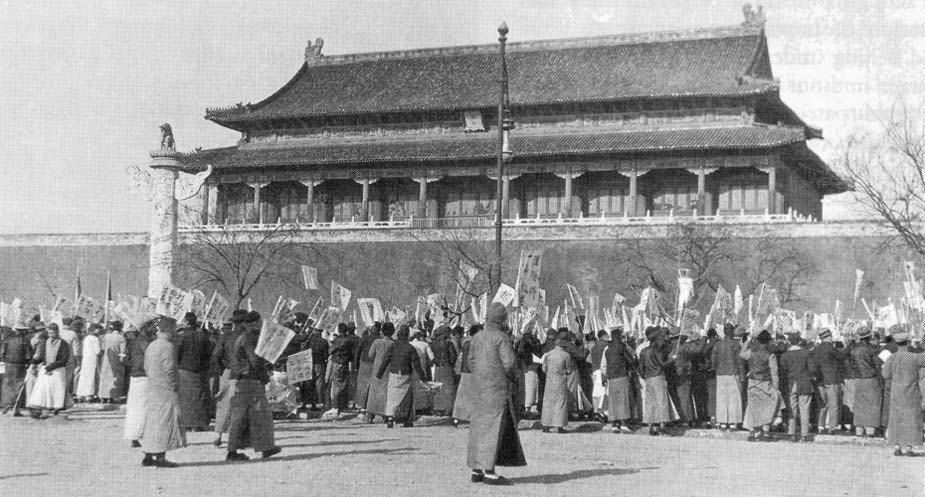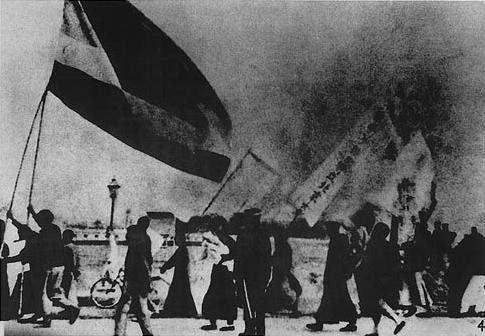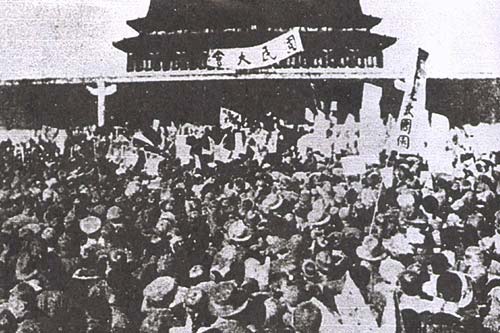 The May Fourth Movement was a student political, cultural, and anti-imperialist movement with its roots in Beijing. It began with a series of demonstrations by students on May 4, 1919, in which they were objecting to what they saw as their government’s ineffective response to the Treaty of Versailles. The May Fourth Movement gave a boost to nationalism in China, as well as favoring populist causes rather than a small number of elite intellectuals. The movement and its aims are still commemorated in China today.
The May Fourth Movement was a student political, cultural, and anti-imperialist movement with its roots in Beijing. It began with a series of demonstrations by students on May 4, 1919, in which they were objecting to what they saw as their government’s ineffective response to the Treaty of Versailles. The May Fourth Movement gave a boost to nationalism in China, as well as favoring populist causes rather than a small number of elite intellectuals. The movement and its aims are still commemorated in China today.
Background to the Movement
The origins of the May Fourth Movement lie in the events of World War One. In 1914, China had taken control of the Shandong Peninsula, which had previously been administered by Germany. A year later, a list of 21 demands was issued by Japan, one of which was recognition of de facto Japanese control of previously German-influenced areas in China. Certain other concessions were also demanded, with Japan threatening to use force if its demands were not met. China, at the time led by the Anfu government, which was highly corrupt, agreed to what was seen as Japan’s humiliating terms.
 In 1917, China declared war on Germany and assisted the Allied side in the conflict. However, this was done on the strict condition that, assuming the Allies won the war, Shandong itself would return to Chinese control. As the birthplace of Confucius, the province had a particular importance for China – but, despite the Allied military triumph in 1918, representatives from China were made to agree to terms in the Treaty of Versailles which followed Japan’s 21 demands and provided for Japanese administration over the province. This was seen as a highly embarrassing, almost shameful, defeat in Chinese diplomatic circles and the country as a whole.
In 1917, China declared war on Germany and assisted the Allied side in the conflict. However, this was done on the strict condition that, assuming the Allies won the war, Shandong itself would return to Chinese control. As the birthplace of Confucius, the province had a particular importance for China – but, despite the Allied military triumph in 1918, representatives from China were made to agree to terms in the Treaty of Versailles which followed Japan’s 21 demands and provided for Japanese administration over the province. This was seen as a highly embarrassing, almost shameful, defeat in Chinese diplomatic circles and the country as a whole.
The Shandong Problem
The Shandong Problem, as this part of the treaty came to be known, was all the more humiliating for China because of certain revelations made public at Versailles. In particular, the existence was revealed of treaties that had been agreed in secret between Japan and the major European powers, with the hope of persuading the Japanese to join the war on the Allied side. Furthermore, it transpired that China itself had been a party to this deal – although the Chinese ambassador to France, Wellington Kuo, had personally refused to add his signature.
 The Chinese public as a whole was both upset and angry by the transfer of rights over the Shandong Peninsula to Japan, and the Versailles conference itself received a bad name in China as a result. The treaty was seen as a twofold betrayal – first as a symbol of Japanese brutality and aggression, and second as a marker that the Western powers were uninterested in Chinese feelings as they carved up the map of Asia between them. On May 4, 1919, with no improvement in China’s terms having been achieved, infuriated college students in Beijing decided to hold a demonstration.
The Chinese public as a whole was both upset and angry by the transfer of rights over the Shandong Peninsula to Japan, and the Versailles conference itself received a bad name in China as a result. The treaty was seen as a twofold betrayal – first as a symbol of Japanese brutality and aggression, and second as a marker that the Western powers were uninterested in Chinese feelings as they carved up the map of Asia between them. On May 4, 1919, with no improvement in China’s terms having been achieved, infuriated college students in Beijing decided to hold a demonstration.
The Movement Itself
At half past one in the afternoon of May 4, around three thousand students, drawn from 13 universities around Beijing, came together in Tianenmen Square, in the center of the city. Assembling at the Gate of Heavenly Peace, their intention was the mount a protest against the Versailles conference, and as such they handed out fliers. These were couched in strong terms, emphasizing that Chinese citizens were not willing to see Japan take over territory that had previously been Chinese – and that, they said, should always remain Chinese.
 The students then marched to the part of Beijing where most foreign embassies were situated. There, they distributed letters of protest to a number of ministers from various countries. Later in the afternoon, they went to see three officials of the Chinese cabinet, all of whom had had a role in the signing of the secret treaties with Japan. The mood quickly became ugly, with the Chinese minister to Japan being assaulted and an arson attack on the house of a minister known to be sympathetic to Japan. At this point, the police confronted the demonstrators, arresting 32 of them.
The students then marched to the part of Beijing where most foreign embassies were situated. There, they distributed letters of protest to a number of ministers from various countries. Later in the afternoon, they went to see three officials of the Chinese cabinet, all of whom had had a role in the signing of the secret treaties with Japan. The mood quickly became ugly, with the Chinese minister to Japan being assaulted and an arson attack on the house of a minister known to be sympathetic to Japan. At this point, the police confronted the demonstrators, arresting 32 of them.
News Spreads through China
The news of the demonstration – and, especially, of the protesting students’ arrest – quickly spread throughout the country. Many newspapers published editorials demanding that the students be released. Before long, demonstrations along similar lines to that in Beijing had erupted in a number of other cities, including Shanghai, Nanking, Tianjin, and Guangzhou. By June, labor strikes had been organized and some shops had begun to close, making the situation tenser. Some Japanese residents were attacked and Japanese goods boycotted.
Disturbances continued, to a varying degree, until the government in Beijing acceded to some of the protesters’ demands and agreed that the arrested students would be released. The three cabinet officials would also be dismissed. In fact, the entire cabinet handed in its resignation, and in Versailles, the Chinese delegation stated that it was not willing to sign the peace treaty. Arguments over the Shandong Problem continued for three more years, and it was only at the 1922 Washington Conference that the issue was finally settled and Japan withdrew its territorial claim.
Impact on Modern China
Although there have been more recent student protests, most famously those of 1989, the May Fourth Movement marked the introduction of new ideas into Chinese cultural life. In particular, it was in the forefront of the anti-imperialistic, patriotic mood that was just arising in China in 1919. Because of the lack of television and radio at the time, the written word was the most significant way of mobilizing the masses. The resulting articles were often written by intellectuals who had returned to China after years studying in Japan.
These intellectuals tended to encourage a revolution in Chinese social attitudes, departing from the traditional values of deference and strong family bonds that had characterized China since the time of Confucius. On top of this, self-expression was highly encouraged by the new writers, including in controversial areas such as sexual freedom. Thus, the May Fourth Movement marked a decisive break with the past, setting China on the road to being the more modern nation that it became a century later.